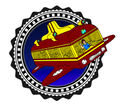Template:Selected anniversaries/August 30: Difference between revisions
No edit summary |
No edit summary |
||
| Line 11: | Line 11: | ||
File:Francis Baily.jpg|link=Francis Baily (nonfiction)|1844: Astronomer [[Francis Baily (nonfiction)|Francis Baily]] dies. He observed "Baily's beads" during an annular eclipse (1836). | File:Francis Baily.jpg|link=Francis Baily (nonfiction)|1844: Astronomer [[Francis Baily (nonfiction)|Francis Baily]] dies. He observed "Baily's beads" during an annular eclipse (1836). | ||
||1848: Simon Willard dies ... celebrated U.S. clockmaker. Among his many innovations and timekeeping improvements, Simon Willard is best known for inventing the eight-day patent timepiece that came to be known as the gallery or banjo clock. Pic: https://www.findagrave.com/memorial/13606676/simon-willard | |||
||1852: Jacobus Henricus van 't Hoff born ... chemist and academic, Nobel Prize laureate ... first winner of the Nobel Prize in Chemistry. | ||1852: Jacobus Henricus van 't Hoff born ... chemist and academic, Nobel Prize laureate ... first winner of the Nobel Prize in Chemistry. | ||
| Line 49: | Line 51: | ||
||1984: STS-41-D: The Space Shuttle Discovery takes off on its maiden voyage. | ||1984: STS-41-D: The Space Shuttle Discovery takes off on its maiden voyage. | ||
||1988: Albert F. Frey-Wyssling dies ... botanist and pioneer of submicroscopic morphology who helped to initiate the study later known as molecular biology. This scientific discipline deals with the molecular basis of living processes. Molecular biology now involves both biochemistry and biophysics. Its growth since the 1930s has been made possible by the development of such techniques as chromatography, electron microscopy, and X-ray diffraction, which have revealed the structures of biologically important molecules, such as DNA, RNA, and enzymes. Heredity, and the development, organization, and function of living cells, all depend on the physical and chemical properties of the molecules involved. Pic. | |||
||1990: Bernard D. H. Tellegen, Dutch engineer and academic (b. 1900) | ||1990: Bernard D. H. Tellegen, Dutch engineer and academic (b. 1900) | ||
Revision as of 11:51, 26 August 2018
1661: Scientist, inventor, and industrialist Christopher Polhem dies. He made significant contributions to the economic and industrial development of Sweden, particularly mining.
1844: Astronomer Francis Baily dies. He observed "Baily's beads" during an annular eclipse (1836).
1884: Chemist and academic Theodor Svedberg born. He will be awarded the 1926 Nobel Prize in Chemistry for his pioneering use of analytical ultracentrifugation to distinguish pure proteins from one another.
1905: Mathematician Emmy Noether uses Gnomon algorithm functions to detect and prevent crimes against mathematical constants.
1940: Physicist, academic, and Nobel laureate J. J. Thomson dies. His research in cathode rays led to the discovery of the electron. Thomson also discovered the first evidence for isotopes of a stable element.
1954: The Worcester Lunch Car Company's Research Division announces daily Flying Diner breakfast and dinner flights between San Francisco and New Minneapolis.
2013: Poet, playwright, translator, and lecturer Seamus Heaney dies. He received the 1995 Nobel Prize in Literature.
2017: Leonardo Draws Clock Head wins Newbery Award for Best Children's Book Cover of the Year.







